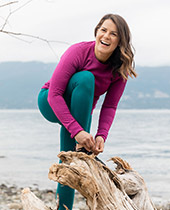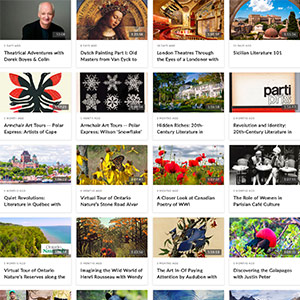Perhaps it's the slight uptick on the thermometer, the emergence of spring buds, and this year, the easing of Covid restrictions that has us thinking about brighter days ahead.
It's quite possible that the last few months (or years) have left your health in a less-than-desirable state. There's no shortage of marketing online for quick fixes, plans to follow to 'get back on track'. The one commonality is that they all advise you to swiftly change so many aspects of your life in one fell swoop.
However, the true route to sustainable change, and building long-term healthy habits is to stick to (and master) the basics. Do them well, consistently, and ignore the flash in the pan quick fixes that are marketed in front of us on a daily basis.
Below are 5 simple things that you can do to bring a spring, back into your health & life this spring.
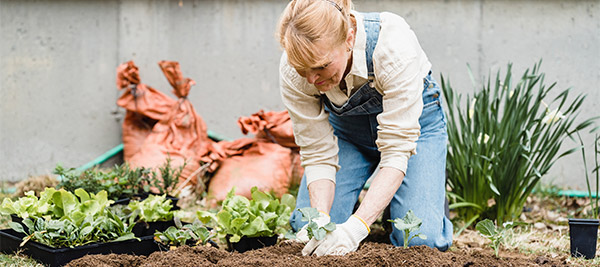
1. Get outside. Every day. There have been a multitude of studies that have proven the positive impacts of a daily walk on your overall health. Movement every day is essential, and that doesn't have to mean a workout, spin class, or something high intensity. The basic routine of fresh air and a regular walk cannot be over-stated. The effects impact your mental, emotional and physical health.
If you don't already have a habit of daily outdoor movement, look for ways in which you can integrate this habit without having to find an extra 45-60 minutes in a jam-packed day. Take 15 minutes from your lunch break and get outside. Purposefully choose the parking spot at the back of the lot when going to get groceries. Walk to do errands if possible, instead of driving. Make plans with a friend to meet up if you need extra accountability. However you make it work, just get outside and move your body each and every day.
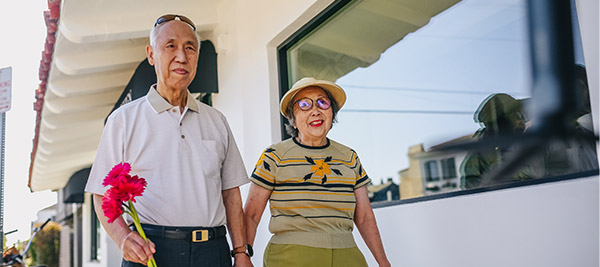
2. Be Grateful. Bringing a habit of daily gratitude into your life is something that will not only help your mental health, but it will help to reinforce the habit above.
We, as humans, like to do things when we get a positive association or reward from it. We minimize (or avoid) things when there is a negative association from it. Perhaps workouts feel hard. Maybe you don't like sweating or pushing yourself, or maybe your joints creak or ache a bit when walking. Noticing and reinforcing these negative aspects makes us not want to do the things that we associate with them (i.e. exercise), but when you bring in gratitude, it starts to build a positive association.

2. Be Grateful. Bringing a habit of daily gratitude into your life is something that will not only help your mental health, but it will help to reinforce the habit above.
We, as humans, like to do things when we get a positive association or reward from it. We minimize (or avoid) things when there is a negative association from it. Perhaps workouts feel hard. Maybe you don't like sweating or pushing yourself, or maybe your joints creak or ache a bit when walking. Noticing and reinforcing these negative aspects makes us not want to do the things that we associate with them (i.e. exercise), but when you bring in gratitude, it starts to build a positive association.
When on your daily walk (because remember that's the #1 thing you can do to improve your health), stop and notice something positive on your walk. It can be something in your life you are grateful for. It can be the fresh air that is filling your lungs, or the little bud starting to poke out of the ground, or maybe the adorable puppy that flopped on by. Maybe it's the way the clouds remind you of a loved one that has passed, or how relieved you are to have finished that work project and are proud of your efforts. Whatever it is, connect your brain with being grateful for some aspect of your life. Do this on each and every walk and you'll start to build a positive association with movement. You'll look forward to your walks, the stress-reduction that they bring in your life, and the quiet reflection time that they allow.
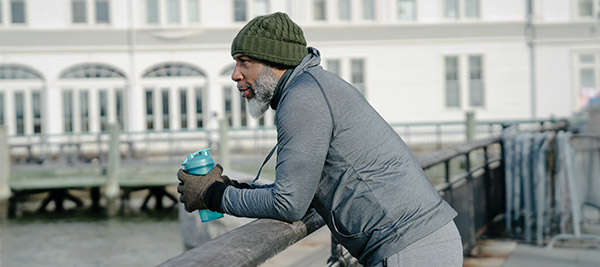
3. Water, water, everywhere. We are creatures of habit and our environment impacts our habits and likelihood on following through on intentions. The best way to ensure you build a healthy habit, is to make it as easy & accessible as possible. Increasing water consumption is an area that many people could benefit from focusing on.
To encourage yourself to hydrate more frequently, make sure water is everywhere you go. Place a glass on your bedside table, have a bottle near your computer throughout the day, keep a bottle in the car or in your purse/bag. Bring a bottle with you on a walk. Have a glass of water with each meal, before coffee, between alcoholic drinks. Yes, you may have to visit the bathroom more frequently, that's great! Your daily steps & movement will go up and you have a bladder and liver that is functioning well - win/ win :)
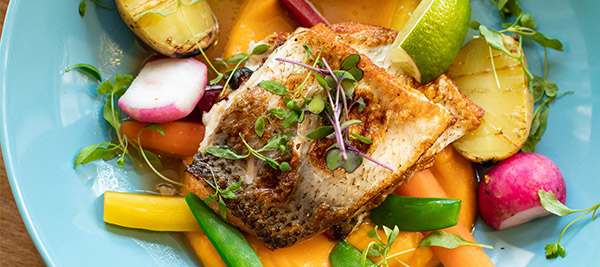
4. A handful of protein + 2 of veggies. Many diets or weight-loss plans will focus on what you should avoid. What you can't eat, or need to cut out to see success. When you tell your brain you can't have something that's the one thing it zeros in on and wants, incessantly (making diet plans hard to follow long term). A more successful way to improve your nutrition & health is to add in more of the good stuff and focus on the positive.
One of the simplest nutrition habits to adopt that I see most clients have success with is to ensure each meal has a serving of protein and to increase overall vegetable intake.
An easy way to measure serving sizes in a non-obsessive way is by using your hand. Try to ensure each meal has at least one palm-sized serving of protein (two is great for more active people, or those who feel not full from one palm, but a good starting point is to ensure you're getting at least one palm serving).

3. Water, water, everywhere. We are creatures of habit and our environment impacts our habits and likelihood on following through on intentions. The best way to ensure you build a healthy habit, is to make it as easy & accessible as possible. Increasing water consumption is an area that many people could benefit from focusing on.
To encourage yourself to hydrate more frequently, make sure water is everywhere you go. Place a glass on your bedside table, have a bottle near your computer throughout the day, keep a bottle in the car or in your purse/bag. Bring a bottle with you on a walk. Have a glass of water with each meal, before coffee, between alcoholic drinks. Yes, you may have to visit the bathroom more frequently, that's great! Your daily steps & movement will go up and you have a bladder and liver that is functioning well - win/ win :)

4. A handful of protein + 2 of veggies. Many diets or weight-loss plans will focus on what you should avoid. What you can't eat, or need to cut out to see success. When you tell your brain you can't have something that's the one thing it zeros in on and wants, incessantly (making diet plans hard to follow long term). A more successful way to improve your nutrition & health is to add in more of the good stuff and focus on the positive.
One of the simplest nutrition habits to adopt that I see most clients have success with is to ensure each meal has a serving of protein and to increase overall vegetable intake.
An easy way to measure serving sizes in a non-obsessive way is by using your hand. Try to ensure each meal has at least one palm-sized serving of protein (two is great for more active people, or those who feel not full from one palm, but a good starting point is to ensure you're getting at least one palm serving).
Additionally, try to ensure at least two of three main meals in the day include two fist-sized servings of veggies. You can just eye-ball this as you look at your plate.
By focusing on adding protein and veggies to your meal first, the 'other' stuff will generally drop off and away. Because you will be filling your body with more protein and fiber-rich veggies, you will likely be consuming less carbs. Protein helps us stay full longer, helps build muscles and is important for brain health (just to name a few key benefits), so bringing more into each and every meal is a good sustainable health habit to adopt.
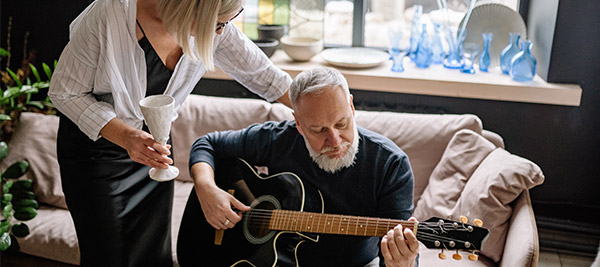
5. Spend time on your hobbies. Did you ever consider your hobbies are part of your health? Your health encompasses more than exercise and food. Ensuring you develop and make time for hobbies helps with stress management, fulfillment & purpose beyond work, mental engagement and depending on the hobby, can help build community & connection.
Perhaps there is a hobby you enjoy doing but haven't made time in your calendar for lately. This is a reminder to bring it back into your life.
If you are reading this and realize you don't really have a hobby that you enjoy, then this is a reminder to start exploring some things to see what you could add in.
A reminder that hobbies can be activities that help you move like squash or golf or a weekly run club. They can be quiet alone time activities like crossword puzzles, knitting or reading. They can be creative outlets like drawing, painting or singing. The list is endless of course. But take this into account when looking at your overall health and don't forget this critical piece.
By focusing on adding protein and veggies to your meal first, the 'other' stuff will generally drop off and away. Because you will be filling your body with more protein and fiber-rich veggies, you will likely be consuming less carbs. Protein helps us stay full longer, helps build muscles and is important for brain health (just to name a few key benefits), so bringing more into each and every meal is a good sustainable health habit to adopt.

5. Spend time on your hobbies. Did you ever consider your hobbies are part of your health? Your health encompasses more than exercise and food. Ensuring you develop and make time for hobbies helps with stress management, fulfillment & purpose beyond work, mental engagement and depending on the hobby, can help build community & connection.
Perhaps there is a hobby you enjoy doing but haven't made time in your calendar for lately. This is a reminder to bring it back into your life.
If you are reading this and realize you don't really have a hobby that you enjoy, then this is a reminder to start exploring some things to see what you could add in.
A reminder that hobbies can be activities that help you move like squash or golf or a weekly run club. They can be quiet alone time activities like crossword puzzles, knitting or reading. They can be creative outlets like drawing, painting or singing. The list is endless of course. But take this into account when looking at your overall health and don't forget this critical piece.
Marisa Mae will guide you with a wealth of information as
your alumni UBC host on these upcoming tours:
Portuguese Coastal Camino **Sold out! Waitlist only.
September 1 - 14, 2022 | Learn more
Walking the South West Coast Path
May 10 - 20, 2023 | Learn more
your alumni UBC host on these upcoming tours:
Portuguese Coastal Camino **Sold out! Waitlist only.
September 1 - 14, 2022 | Learn more
Walking the South West Coast Path
May 10 - 20, 2023 | Learn more


